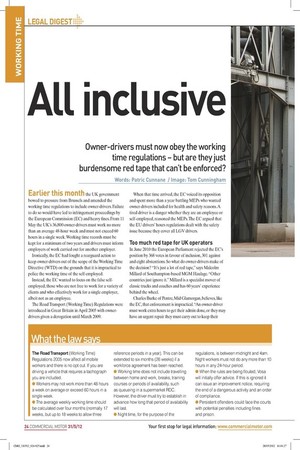What the law says
Page 19

Page 20

If you've noticed an error in this article please click here to report it so we can fix it.
The Road Transport (Working Time) Regulations 2005 now affect all mobile workers and there is no opt out. If you are driving a vehicle that requires a tachograph you are included.
• Workers may not work more than 48 hours a week on average or exceed 60 hours in a single week.
• The average weekly working time should be calculated over four months (normally 17 weeks, but up to 18 weeks to allow three reference periods in a year). This can be extended to six months (26 weeks) if a workforce agreement has been reached.
• Working time does not include travelling between home and work, breaks, training courses or periods of availability, such as queueing in a supermarket RDC. However, the driver must try to establish in advance how long that period of availability will last.
• Night time, for the purpose of the regulations, is between midnight and 4am. Night workers must not do any more than 10 hours in any 24-hour period.
• When the rules are being flouted, Vosa will initially offer advice. If this is ignored it can issue an improvement notice, requiring the end of a dangerous activity and an order of compliance.
• Persistent offenders could face the courts with potential penalties including fines and prison. truck on the road,” he says. “The whole thing is shambolic. Owner-drivers have to work harder than anyone else. Why criminalise people for doing their normal daily work? If there was a huge record of owner-drivers flouting the law, then fair enough – but there isn’t.” He is sceptical whether many owner-drivers will keep the records required: “The MEPs haven’t really thought through the logic of it.”
The wrong decision?
Roads minister Mike Penning sympathises with the owner-drivers: “This is the wrong decision, and we did everything possible to prevent this from happening,” he says. “This feeling is shared by a majority of other member states.” He adds that the changes will be implemented in the “least burdensome way possible” .
Vosa says it will take a ‘light touch’ and adopt a pragmatic approach to owner-drivers falling foul of the regulations within the first six months. Offenders will receive advice on the requirements rather than facing stringent enforcement action.
Many will say that Vosa has been taking a light touch to the regulations since their implementation in 2005, as no operators have been prosecuted. However, hauliers should still be wary of flouting the law. If they are unlucky enough to be prosecuted by the Health and Safety Executive as a result of a workplace fatality, the absence of working time records could be a major factor in the case against them.
The Road Haulage Association (RHA) has briefed its members on the changes to the law. “Given the serious problems facing the industry this is not the most important issue,” says RHA director of policy Jack Semple. “There are more pressing enforcement issues, such as tacho fiddling and diesel laundering.” Semple points out that Vosa will not be penalising owner-drivers for carrying out routine paperwork, such as preparing invoices or accounts. Owner-drivers who are unsure how the regulations will affect them should contact Vosa for further advice, or talk to another operator to find out how they have managed with the changes. n
Further Information
www.vosa.gov.uk













































